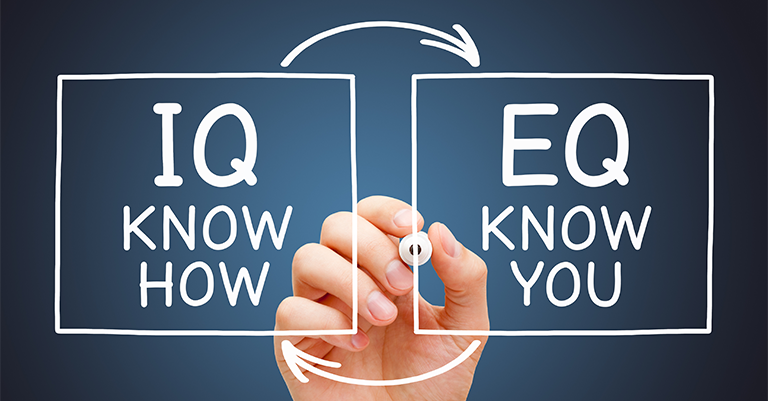Mastering Emotional Intelligence to Better Understand and Lead Your Team
Emotional intelligence (EQ) means knowing, understanding, and managing feelings. It’s important for building strong workplace relationships. Leaders with emotional intelligence can better understand their teams and create a positive work environment. This skill helps leaders connect with people, solve conflicts, and support their teams beyond just talking.
In this post, we’ll explain what emotional intelligence is, why it’s important, and how to build it. Improving your EQ will help you understand your team and make a place where everyone can succeed.
What is Emotional Intelligence and Why It Matters for Leaders

Emotional intelligence is the key to good leadership. It helps leaders understand both their own emotions and their team’s feelings. This skill isn’t just about managing emotions; it helps leaders make better choices and create a happier team.
A leader with high emotional intelligence understands their team’s emotions. They can spot stress or frustration early and fix problems before they get worse. By understanding feelings, leaders can build trust and solve problems more easily. Leaders with emotional intelligence can create a strong team where everyone feels valued and understood, which raises team spirit and work quality.
Leaders without emotional intelligence may have trouble connecting with their teams. This can cause misunderstandings or lack of motivation. By improving this skill, you become a better leader and help your team do better and feel happier.
Key Components of Emotional Intelligence in Leadership
Emotional intelligence has several key parts that are important for good leadership. These include self-awareness, self-control, and empathy. Each of these helps leaders build strong connections with their teams.
Self-Awareness
Self-awareness means knowing your own feelings and how they impact your thoughts and actions. As a leader, being self-aware helps you understand how your mood can affect your team’s energy and focus. When leaders understand their emotions, they can stop bad feelings from spreading to the team. It also helps leaders see their strengths and weaknesses, leading to better decisions and stronger leadership.
To build self-awareness, take time to think about how you react in different situations. Notice your triggers—when you feel stressed, angry, or frustrated. By recognizing these feelings early, you can manage them before they affect your team.
Self-Regulation
Self-regulation means controlling your emotions, especially during stressful times. Leaders who manage their emotions stay calm under pressure, helping keep the workplace steady. When team members see their leader staying calm, they feel safer and are more likely to do the same.
Practicing self-regulation involves taking a moment before reacting. Think about how your response will affect your team and choose actions that lead to positive results.
Empathy

Empathy means understanding and sharing the feelings of others. In leadership, it helps spot when a team member feels overwhelmed or stressed, so leaders can offer support. Empathy builds trust, which helps create a strong team. When leaders show empathy, they let the team know their feelings matter and they aren’t alone.
Empathetic leaders ask questions and listen carefully. This makes team members feel understood. They also create a safe space where people can talk openly, leading to better teamwork and problem-solving.
Motivation
Motivation is an important part of emotional intelligence that affects both personal and team success. Leaders with strong motivation are driven by things inside them, like wanting to grow or having a strong purpose. They care more about personal growth than rewards like money or promotions. Motivated leaders push their teams to work hard and keep going, even when things are tough.
A leader’s motivation can impact the whole team. When leaders show passion and a positive attitude, the team feels it too. Teams are more likely to focus, overcome problems, and stay positive. Leaders can build motivation by sharing the organization’s goals, staying excited about progress, and celebrating every win, big or small. By sharing their passion, motivated leaders help their teams stay strong during hard times.
Social Skills
Social skills are another key part of emotional intelligence. Leaders with strong social skills can build good relationships, solve conflicts, and create teamwork. These leaders are great at listening and speaking. They know how to connect with their team in ways that build trust.
Good social skills also mean managing relationships and networks. Leaders with this skill can handle tough social situations, like guiding a team through a conflict or working with different departments. They are good at solving problems and promoting teamwork, which brings the team closer and makes the workplace better.
Social skills, along with empathy and self-awareness, help leaders manage teams better. Leaders who are strong in this area can share their vision clearly, create a positive team environment, and make sure each team member feels heard and important.
How Emotional Intelligence Strengthens Team Communication

Communication is the most important part of any team. Emotional intelligence helps leaders communicate better with their teams. Leaders with strong emotional intelligence can handle conversations well and make sure everyone feels heard and respected.
Active Listening Techniques
Active listening is an important part of emotional intelligence. It means understanding the feelings behind what’s being said, not just hearing the words. Leaders who listen closely can notice unspoken emotions like frustration or excitement, which helps solve problems early.
To practice active listening, focus completely during conversations. Don’t interrupt or think about your reply while the other person is talking. This shows respect and builds trust with your team.
Giving Constructive Feedback
Feedback helps people grow, but it can be stressful if not done right. Leaders with strong emotional intelligence give feedback in a way that helps, not hurts. By thinking about how feedback makes someone feel, leaders can use words that lead to positive changes.
When giving feedback, talk about actions, not personal traits. Use supportive words that focus on solutions, so your team knows how to improve without feeling bad.
Encouraging Open Dialogue
Emotional intelligence helps leaders create a space where open talk is welcome. Leaders with strong EQ know how important it is to let team members share their opinions, worries, and ideas without fear. This makes communication better because everyone feels safe sharing their thoughts and knows they will be listened to.
When people feel safe to speak up, leaders can find problems early and fix them before they get worse. By creating this safe space, leaders build stronger team connections, which leads to more teamwork. Emotional intelligence helps leaders listen with care, understand feelings, and get everyone involved, building better trust and communication.
Promoting Nonverbal Communication Awareness
Emotional intelligence also helps leaders notice nonverbal cues, like body language, facial expressions, and tone of voice. Leaders with strong EQ can tell how team members are feeling, even if they don’t say it out loud. This skill helps leaders spot signs of frustration, stress, or lack of interest and respond quickly.
By paying attention to these cues, leaders can fix problems early. For example, if someone looks uncomfortable in a meeting, a leader with high EQ might pause and check on them. This helps prevent misunderstandings and keeps everyone on the same page.
Developing Emotional Intelligence as a Leader

Building emotional intelligence takes time and practice. Leaders who focus on this skill will notice better teamwork, trust, and performance. There are many ways to improve emotional intelligence and use it in your leadership.
Building Emotional Awareness in the Workplace
To build emotional awareness, first notice your own emotions and your team’s emotions as they happen. Encourage open talks about feelings, and create a space where emotions are shared, not hidden. Regular check-ins can help spot problems that may lower morale or hurt productivity.
Strengthening Your Team with EQ
Leaders can make their teams stronger by using emotional intelligence in daily conversations. Show empathy, listen carefully, and control your emotions when things get tough. Leading with emotional intelligence builds trust, teamwork, and respect, which makes your team more successful and able to handle challenges.
Final Thoughts on Emotional Intelligence for Leaders
Emotional intelligence is key for leaders who want to understand and support their team. By developing skills like self-awareness, empathy, and clear communication, leaders can build stronger connections with team members. This helps create trust, boost morale, and improve teamwork and productivity.
Using emotional intelligence in leadership is more than just handling tasks—it means understanding the feelings and needs of everyone. When leaders show emotional intelligence, they help their team do their best and create a workplace where everyone feels important. By constantly improving emotional intelligence, leaders become more effective and inspire their teams to grow and succeed. In today’s fast-paced world, strong communication and relationships make emotional intelligence the difference between a team that works and a team that truly thrives.




